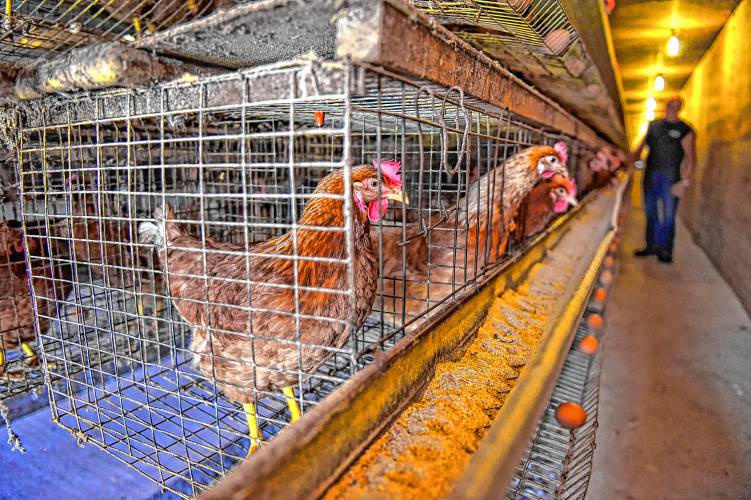My Turn: The pecking order revolution: Massachusetts’ fight for animal rights

STAFF FILE PHOTO/PAUL FRANZ STAFF FILE PHOTO/PAUL FRANZ
|
Published: 04-16-2024 7:01 AM
Modified: 04-16-2024 11:44 AM |
Massachusetts residents care about the living conditions of egg-laying hens, veal calves, and pigs. In November 2016, voters passed Ballot Question 3, the Massachusetts Minimum Size Requirements for Farm Animal Containment. With a sweeping majority of 78%, this initiative ensured that eggs, veal, and pork not raised to humane standards would not be sold in Massachusetts.
Before the ballot question was enacted into law, 13 states, including poultry and pork powerhouses like Iowa, Ohio, and Indiana, filed a lawsuit against Massachusetts in the U.S. Supreme Court. They argued it was unlawful for Massachusetts to “dictate how other states choose to regulate business operations and manufacturing processes within their own borders.”
For them, animal husbandry has become a business operation and manufacturing industry. The Supreme Court denied permission to file a complaint against Massachusetts. However, the court did hear arguments for a similar ballot initiative posed in California, Prop. 12, the Farm Animal Confinement Initiative. Like Ballot Question 3, Prop. 12 requires minimum space requirements for farm animals. The law passed with 63% of the vote in the state when on the ballot in 2016, but faced years of appeals until the Supreme Court upheld the decision in 2023.
The Act to Prevent Cruelty to Farm Animals was put into effect in Massachusetts in January 2022. Hens moved into “aviary” style cage-free facilities where they could satisfy a preference for high perches and sleep in high roosts. Gestation crates for pregnant pigs, which limit the ability to move around during pregnancy, were banned. Calves raised for veal must be raised with enough space to move freely.
Massachusetts implemented a new egg law in 2023 in response to increasing consumer demand for ethically sourced eggs. This law mandated more space for hens and better living conditions. Labels must clearly indicate whether eggs are cage-free, free-range, or produced under other specified conditions. Traceability measures were incorporated into the law to track the source of eggs. Producers also must adhere to responsible antibiotic use.
More environmentally sustainable practices are encouraged, including reducing resource consumption, minimizing waste, and implementing eco-friendly initiatives. The state’s commitment is backed up by consequences for not complying with the law, including fines, license revocation, product recalls, legal actions, loss of market access, reputation damage, and increased regulatory scrutiny.
Changing the pecking order with more freedoms and better lives for chickens, calves, and pigs in Massachusetts ruffled the feathers of those who rule the roost in Washington. They have struck back with the Ending Agricultural Trade Suppression Act (EATS Act).
Article continues after...
Yesterday's Most Read Articles
 Carol Doucette of Royalston receives $15,000 from Publishers Clearing House
Carol Doucette of Royalston receives $15,000 from Publishers Clearing House
 State documents show Northfield EMS chief’s paramedic license suspended over failure to transport infant
State documents show Northfield EMS chief’s paramedic license suspended over failure to transport infant
 Plan calls for upgrades to Silver Lake in Athol
Plan calls for upgrades to Silver Lake in Athol
 Royalston’s FinCom debates proposed salary increases
Royalston’s FinCom debates proposed salary increases
 What are the protocols for emergency transport of infants?
What are the protocols for emergency transport of infants?
 Magic comes to Red Apple in Phillipston
Magic comes to Red Apple in Phillipston
This proposed law seeks to void mandates in California and Massachusetts that prevent cruelty to animals and to assume control of the “pre-harvest” production of all agricultural products. It declares by fiat that states cannot impose public health and welfare standards for a broad suite of agricultural products, including farms, ranches, fisheries, invasive species and plant disease protections, avian flu, honeybee diseases, labeling requirements of toxic seed treatments, and illegal drug laws.
This assault on animal welfare, healthy foods, farmers and ranchers is not new. In 1929, J.P. Morgan’s Standard Brands, C.W. Post’s General Foods, and others competed to buy out all brands people trusted for good food. They became the richest men in America by, for example, devaluing pigs to a fraction of their historical value — so low that only industrial corporations could afford to produce them. A farmerwho once kept 14 sows producing 100 fattened pigs a year had to give it up.
Fast-forward to today, and consumers are more educated about the food they eat — how it is raised, sourced, and produced. In fact, a recent poll found that nearly 80% of Americans are concerned about the negative impacts of industrial animal agriculture on animal welfare, second only to their concern about its effect on public and community health.
The chicken has already flown the coop. Farmers and ranchers have invested in more humane and ecological practices. Across the nation, the egg industry is already 40% cage-free. More than 1,250 pork producers and distributors comply with the more humane standards. In opposition to the EATS Act, 25 grass-fed beef purveyors have joined with more than 500 independent family farmers, raising pigs crate-free and providing as low-stress a life as possible.
Rob Moir is a nationally recognized and award-winning environmentalist. He is president and executive director of Cambridge, MA-based Ocean River Institute. Mike Salguero is the founder and CEO of ButcherBox, the leading direct-to-consumer meat & seafood brand. He has been on the forefront of the claims-based meat movement since founding the company in 2015.

